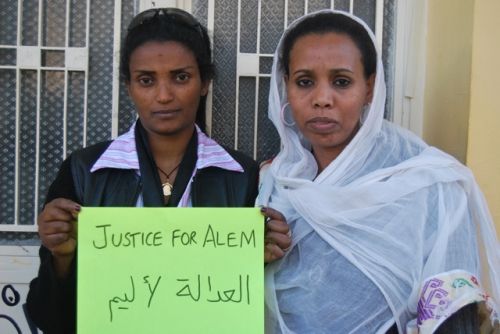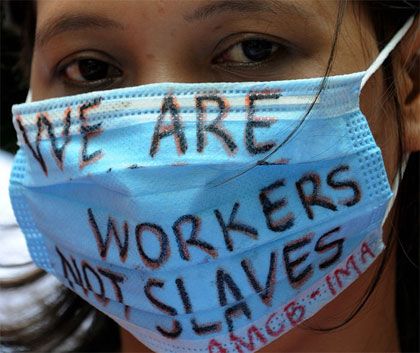By Al-Manar (BEIRUT), Ethiopiantimes

University students surveyed last month in
Lebanon on the subject of how to improve their society and move it in
the direction of meeting international human and civil rights norms
identified three groups most in urgent need of immediate Lebanese
governmental action. Not surprising perhaps, but nevertheless refreshing, were the
students strongly expressed convictions, regardless of particular sect,
that those most victimized by Lebanon’s government and current laws are
the roughly 200,000 migrant domestic workers, women, who make up half of
Lebanon’s population, and the estimated 250,000 Palestinian refugees
waiting to return to their country, Palestine.
The wretched domestic workers……..
 |
Last month’s suicide by domestic worker 33 years old Alem Dechasa-Desisa,
following a beating in front of her Ethiopian Consulate by Ali Mahfouz
and his colleague, whose recruitment agency arranged for Alem to work in
Lebanon, was condemned across this country and angered those watching
the video of the beating on LBCI TV. Dechasa claimed that a recruitment agent beat her and
threatened to send her back to Ethiopia after she was dismissed by two
employers.

This incident once more raised the near slavery plight of workers
from Sri Lanka, Ethiopia, Sudan, the Philippines, and Nepal and
elsewhere who are excluded from the Lebanon’s labor law. Among the triad
of the most wretched in Lebanon, domestic workers suffer the most.
Once again, the Lebanese government issued a seemingly pro forma
statement to say it would investigate the despicable abuse of domestic
workers. Few here have confidence that anything will come of the current
“investigation” any more than usually results from police or ministry
investigations of domestic workers abuse.
“The Lebanese authorities only opened an investigation because they
found themselves in the media spotlight,” Nadim Houry, the deputy Middle
East and North Africa director at Human Rights Watch, told a news
conference, adding that “The government urgently needs to address the
root causes that are driving so many migrant domestic workers to
despair.” More than a dozen Civil society groups also cited a culture of
impunity when it comes to the abuse of domestic workers in Lebanon.
In a 2008 study, Human Rights Watch found that there had been an
average of one death a week from unnatural causes among domestic workers
in Lebanon, including suicides and unexplained falls from tall
buildings. Domestic workers are subject to restrictive immigration rules
based on employer-specific sponsorship that puts workers at risk of
exploitation and makes it extremely difficult for them to leave abusive
employers, The Philippines, Ethiopia and other countries have banned
their citizens from working in Lebanon due to the lack of protection
from Lebanon yet many still come here in order to work and send money
back home to their families.
According to HRW, the most common complaints documented by the
embassies of labor-sending countries and civil society groups include
mistreatment by recruiters, non-payment or delayed payment of wages,
forced confinement to the workplace, a refusal to provide any time off
for the worker, forced labor, and verbal and physical abuse. HRW also
cited information prepared by KAFA Violence & Exploitation, a
Lebanese women’s rights group, concerning nine suspicious deaths in
August 2010. A number of factors mean that MDWs often do not file or pursue
complaints against their employers, but rather settle on unfavorable
terms. These include lack of judicial support, fear of counter charges
and being held in detention, and restrictive visa policies that make it
hard for MDWs to see through cases that can take months or years to word
through the protracted judicial process.
For many, the need to earn money to support their families, and the
impulse of abused workers to return home quickly prompts them to
withdraw their complaints rather than seek redress. A Human Rights Watch review of 13 criminal cases that MDWs brought
against employers found they took an average of 24 months to be
resolved, while MDW complaints for unpaid wages filed in civil courts
lasted between 21 and 54 months. Complaints brought before labor courts,
which are supposedly faster than regular civil courts because their
procedures are simpler, lasted 32 months on average.
The wretched Women of Lebanon– half of the population…
Lebanese law prevents women married to a non-Lebanese from passing
citizenship on to her children. Much like the right to property, which
women in Lebanon, like Palestinians also don’t enjoy fully, the value of
citizenship and family rights is meaningless when the state restricts
transferability. This means that many children born and raised in
Lebanon are required to regularly reapply for permits to continue living
in the country.
Lebanon’s Nationality Law Forbids Women From Passing on Citizenship to Children
Since Lebanese law does not provide a clear judicial standard
children must deal with the administrative maze of Lebanon’s corrupt and
notoriously inefficient bureaucracy. As the children grow into adults, they face restrictions on foreign labor,
property ownership and a host of other implications much like
Palestinian refugees. While diaspora Lebanese may have citizenship from
other countries, they can also claim Lebanese citizenship via paternal
consanguinity, but people born and raised in Lebanon depend on the
arbitrary decisions of the security services.
Women also remain invisible in positions of formal power such as
Parliament. No women serve in Lebanon’s cabinet, while only four women –
the usual group of wives, sisters and daughters – are Members of
Parliament. Some have proposed a quota for women in Parliament. According to
lawyer Anthony Elghossain “in a political culture that derides women for
being outspoken and active, a quota would amount to little more than a
paper reform. Indeed, without changing other aspects of Lebanese electoral law, a quota
system would probably add a bunch of “yes women” to the flock of male
sheep that is Lebanon’s legislature.” The question of “marital rape” also continues to make a mockery of
current Lebanese laws. Male rapists may rape at will since their crime
is not defined as rape in the first place just so long as long as they
are married to the woman they rape or if they subsequently propose
marriage to their victims.
Nearly impossible as it is to believe, some in Lebanon’s Parliament such as Imad Hout told The Beirut Daily Star last
month that “[t]here’s nothing called rape between a husband and a
wife,” but only the act of “forcing someone violently to have
intercourse.”
http://ethiopiantimes.wordpress.com/2012/04/08/ethiopian-women-suffering-in-libanon/
No comments:
Post a Comment